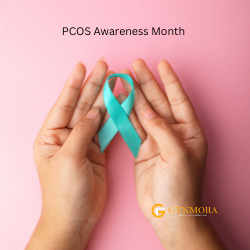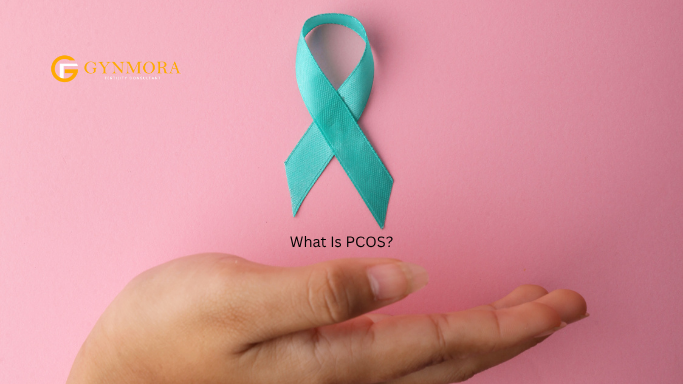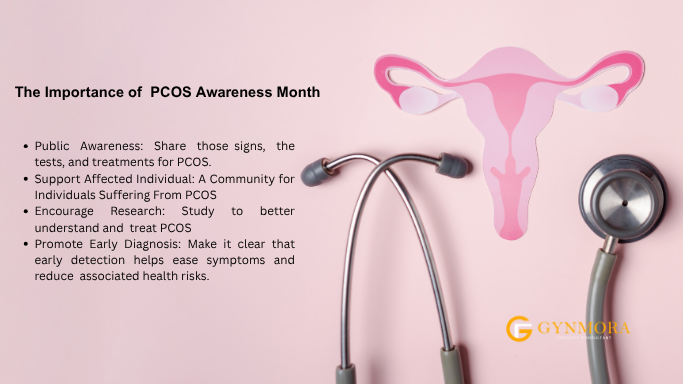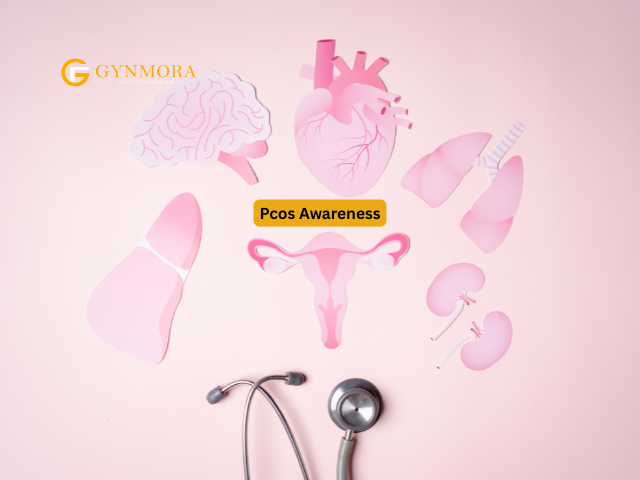PCOS Awareness Month

September is Polycystic Ovary Syndrome Pcos Awareness Month a chance to raise awareness about a condition that affects millions of women around the world. You are your best expert, at GYNMORA, we believe information is the cornerstone of your fertility and reproductive health. PCOS, or polycystic ovary syndrome, is a standard and a major cause of infertility and related health problems, so it pays to know about it.
What Is PCOS?
Polycystic ovary syndrome (PCOS) is an endocrine disorder that affects women of reproductive age and is considered to be one of the most common ones. It is defined by oligomenorrhea/amenorrhea hyperandrogenism and/or polycystic ovaries.

The symptoms may be weight gain, acne, hirsutism (excess hair on the body), or scalp hair loss. PCOS is also linked with long-term health risks beyond reproductive challenges, such as type 2 diabetes, heart disease, and endometrial cancer.
The Importance of PCOS Awareness Month
This month-long observance was established to bring national attention and awareness to PCOS by:

- Public Awareness: Share those signs, the tests, and treatments for PCOS.
- Support Affected Individual: A Community for Individuals Suffering From PCOS
- Encourage Research: Study to better understand and treat PCOS
- Promote Early Diagnosis: Make it clear that early detection helps ease symptoms and reduce associated health risks.
How to Get Involved
Also, participating in PCOS Awareness Month can have a significant impact. Here’s how to help out:
- Educate yourself and others: Educate yourself and others about PCOS.
- Wear Teal: The PCOS awareness color is Teal . Wear Teal Wears teal, initiates discussions, and stands in solidarity
- Attend Events: Join PCOS awareness events in your local community or virtually via seminars, walks, and fundraisers.
- Support Organizations: Donate or volunteer with organizations, such as the PCOS Awareness Association, that are working to help those with PCOS.
PCOS Spreading Awareness through GYNMORA
If You Struggle With Fertility Issues Like PCOS, Before Going For A Visit to GYNMORA, Find Out More Guides and Articles. Training is up to date until 2023. We want people to feel empowered, to know what reproductive health care is, what their body is, and how they can take care of themselves.
Conclusion
PCOS Awareness Month | Reminds anyone living with Polycystic Ovary Syndrome (PCOS) that there is more than meets the eye when it comes to the mainstream diagnosis. We have to spread the word, help those dealing with it, and advocate for science to help us only live with it, not solve it. We can all do our part to raise awareness this September!
FAQs
Question: What causes PCOS, and how does it happen?
Answer: Experts aren’t sure what the cause of PCOS is, but it is thought to be related to insulin resistance, chronic low-grade inflammation, and family history of the condition.
Question: Can PCOS be cured?
Answer: PCOS is a chronic condition that has no cure at this point, but symptoms can be managed with lifestyle measures (diet and exercise), medications, and clinical interventions.
Question: Isn’t PCOS a reproductive issue only?
Answer: Sorry, but wrong; PCOS is not only a reproduction syndrome; it is also a systemic metabolic and cardiovascular problem and carries a substantial risk of diabetes and other Comorbidities.
Question: How is PCOS diagnosed?
Answer: Diagnosis often involves medical history, physical examinations, blood tests (to check hormone levels), and an ultrasound to examine the ovaries.
Question: Can I get pregnant with PCOS?
Answer: Yes, with appropriate medication or fertility treatment (due to irregular ovulation), just about all PCOS women can conceive.
The Real-Life Experiences of Women Living with PCOS
Many millions of women across the globe have polycystic ovaries syndrome (PCOS), but each of us has our own story. Below are a few real stories that highlight the challenges and triumphs of the PCOS journey.
Natalie’s Road to Motherhood
Natalie had infiltration from PCOS. She and her husband opted to undergo intrauterine insemination (IUI) after chatting with her care team at Illum Fertility. It was early mornings behind the wheel over many months — and, in the end, a colossal amount of support and endless testing. Years of trying later, there was the baby. And so Natalie urges patients and I think probably regardless of what they might have endured to pursue specialized care and never lose hope.
One of Many Pathways to Elizabeth’s Diagnosis
At age 23, Elizabeth received the diagnosis of PCOS (polycystic ovary syndrome) after symptoms began at the age of 11. Her story highlights the fact that so many women find out about PCOS only many years into their battle, a key reason why understanding and awareness are so critical.
Overcoming Cancer with | Chloe ran away from her Diagnosis and moved towards Determination
Chloe shares her journey of the struggle at the start, which she went through after being diagnosed with PCOS, and how she used this struggle to strengthen her willpower. Others pursuing a similar path look to her story for guidance.
The Battle of the Undiagnosed: Mayan Lopez’s PCOS
Actress Mayan Lopez gained 75 pounds within three months during college, along with some other alarming symptoms. Despite living a healthy lifestyle, her condition was difficult to diagnose. Eventually, it all added up to a diagnosis of PCOS (as opposed to premenstrual syndrome) that finally, through much experimentation with lifestyle, provided an explanation of her health problems and how best to deal with them.
The Jaw-Dropping Diagnosis From Florence Pugh
In her twenties at 27 now actress Florence Pugh was diagnosed with PCOS when long, painful periods, breakouts, and weight fluctuations weren’t going away. As a result of some very realistic dreams, she decided to visit her doctor, which kick-started the discovery of her actual reproductive health.
These narratives not only reflect the experience of women living with PCOS, but they also point to the growing need for awareness, early diagnosis, and personalized treatment appropriate to the individual woman.
Overall Purpose
To provide knowledge and raise awareness regarding PCOS Awareness Month, the article would provide insights into what Polycystic Ovary Syndrome is, how it affects women, in turn affecting their health, and how the readers will be able to get involved and raise awareness and support for the people whom it has affected.
Disclaimer
The content in this article is not intended to constitute medical advice. Real-life stories allow us to understand how individuals experience Polycystic Ovary Syndrome (PCOS). However, everyone’s journey is different. Note: If you think you have or suspect you have PCOS or any related symptoms, please consult a qualified health professional before taking any action.
Thank You for Reading

Thanks for taking the time to read why we celebrate PCOS Awareness Month and to listen to stories from someone with PCOS. And this is the best way to advocate for your own lower your cos journey and to spread awareness and knowledge.
Whether you are a source of information, be it news, willing to support people, or spread the word you are doing your part in creating a difference! Please be mindful, be there for everyone in your surroundings, and know you are not alone in this.” Cheers for tuning in to the discussion!




Review Pcos Awareness Month: 4 Reasons Why It’s More important Than Ever.